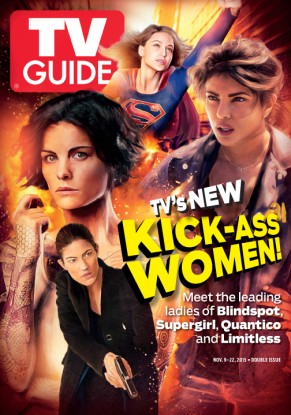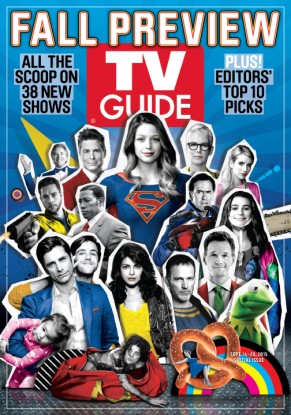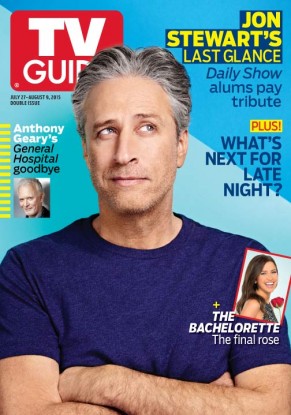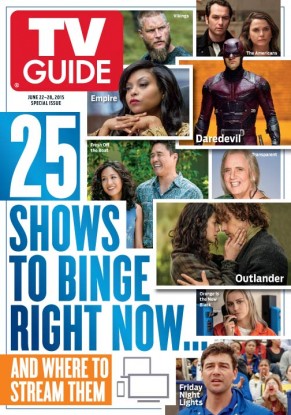After 16 years, 19 Emmys and more zingers than we can count, The Daily Show host Jon Stewart steps away from his desk on August 6. We asked friends and former colleagues to pay tribute to the man of the hour.
John Oliver
Senior British Correspondent
2006–2013
In terms of political comedy on television, Jon Stewart is not just the best there’s ever been; he’s the best there ever will be. To say I wouldn’t be doing what I’m doing now without him is a huge understatement. I wouldn’t even know how. He taught me everything. If he ever needs me to hide a body for him, I’ll do it. Hopefully, he never needs that, but he is from New Jersey, so you never know.
It’s hard to pick a favorite segment [from my time on the show], because they were all fun. I must have dressed up like a Victorian street urchin at least 10 times. I had electoral results projected onto me while wearing a green, skintight bodysuit. I broke my nose fighting the Confederate army in a field piece. I had beans and toast rain down on me in the studio. And I shaved a heart into my chest. I honestly can’t even remember the context of that last one, but I did it. Trying to make Jon laugh every day was the best—and probably most important—part of the job.
Then there was the matter of filling in for him in the summer of 2013. He just called me one weekend and asked me to do it. I instinctively said yes, and it wasn’t until I got off the phone that the gravity of what I’d just agreed to sank in. He believed in me far more than I believed in myself. I think that might actually still be true. —As told to Oriana Schwindt
***
Kristen Schaal
Senior Women’s Issues Correspondent
2008–present
I always felt like Jon Stewart was my boss—a very good boss. Especially with the topics I tackle as the senior women’s issues correspondent, there’s room for so much discussion. He gives notes, and he’s in it from the pitch to the very last rewrite. But he’s doing it in such a way that you feel like it’s a collaboration. If he has a note on something, he guides you to it in a way that you don’t feel like you’re being given a note, but rather that you’re discovering it from his point of view.
Still, I have always been shy around him. He would crack jokes and I would try to crack some back, but there’s such a reverence. I am on the show only a handful of times a year, so I didn’t have an everyday way of getting used to him. But in the last couple of years, I’ve stopped being shy around him, which is a good lesson for me: Get over it…because [eventually] they’ll leave.
I’ve also learned to look at things much deeper because of Jon. It’s so easy to get a topic and just have a knee-jerk reaction to it. But he’ll take it and really inspect it. He makes sure that he is careful with things, and that’s something that has gotten lost in journalism and in the way things are reported today. I think that’s why people want to tune in to The Daily Show—that, and he knows what’s funny. He knows how to take a bill about getting rid of funding for rape victims and make people laugh while they’re taking it in. Comedy is a powerful tool for putting everybody on the same page, and he’s a master at doing that with topics that are important to our whole country.
One piece we were both on board for was a segment about abortion funding. There was this bill that was getting passed that said federal funding wouldn’t pay for abortions, even if the woman was a victim of incest or rape. So I was discussing how much money the Republicans were saving by not protecting these victims and how it came down to two-tenths of a penny per taxpayer. That was the one where I thought, “Oh, this is what I’ve been working so hard for.” I think they even took the language out of the bill the next day, and I was like, “Whoa, this feels really powerful!”
But then they put it back in a couple of weeks later. —As told to Gregory E. Miller
***
Samantha Bee
Most Senior Correspondent
2003–May 2015
Since Jon first announced he was leaving The Daily Show, I have lived in a near-permanent state of misty. So when approached to write a tribute to him, I wasn’t sure my tear ducts could take another hit. Jon, if you’re reading this, go no further, because it’s about to get weepy, and I know you don’t really seek this kind of unabashed praise.
When Jon gave me my shot on the show, it was transformative. He took me from the brink of giving up show business entirely to a place from which a solid career could be built. Working for him was like working in the best comedy training ground a person could ask for. And though I mostly remember those first months as a general feeling of “Oh my God, don’t f— this up” and “Seriously, don’t f— this up,” Jon always had my back. I don’t mind saying that working my ass off with the single goal of making Jon laugh forged my comedy spine out of molten steel.
Oh yes, and then he hired my husband, Jason Jones, as a contributor, too.
As a boss, Jon explicitly urged—no, required—me to explore my passions as a performer, and when I fell apart from it or just needed to sit in his office and cry about it, he was patient and caring without fail. And did I mention how unbelievably supportive he was when I started having kids? I know—working for Jon was quite literally an embarrassment of riches.
So hearing the news that he was leaving The Daily Show was a bit of a gut punch, for sure. And while, yes, I had a job there and all that, my actual first instinct was to react as a fan, because I am a Jon Stewart superfan. It just feels so weird. I completely get [why he’s leaving], but it still feels weird.
And now here I sit dehydrating from all the tears, gently wizening like a raisin, happy for Jon, missing him already and forever grateful.
***
Rob Corddry
Correspondent
2002–2006
Jon Stewart taught me how to write a joke. On my first day I was paired with a writer to work on a bit for that night’s show. I wrote what I thought was a pretty funny script—I don’t remember what it was about, only that I was particularly proud of a line that included something about Rico Petrocelli baseball cards.
Jon read it and, though he gave only a few notes, the resulting script was completely different—and very, very funny. In less than five minutes, he had squeezed a lump of newbie crap into a diamond of perfect clarity. I remember Jon saying, “Cut this Rico Petrocelli stuff.” I realize now that I hadn’t actually written any jokes, only overly specific details and vaguely funny references. I had been writing sketch comedy for years, but it was during that note session that I learned what a joke actually was.
Jon never sat us down and said, “This is how you write a joke.” But the five years I spent watching him take a general idea, zero in on what makes it funny and then plot a course to the biggest possible laugh changed my life in a profound way. I’ve worked with a lot of funny people since, but no one has approached the same process as effortlessly or with such uncommon instinct.
Obviously, I would be nowhere near where I am now if it weren’t for Jon. To say that my Daily Show pedigree earned me the capital to make Childrens Hospital is an understatement. Jon taught me how to make Childrens Hospital. And I still try to channel him when I sit down to write. But I no longer try to figure out what Jon would say about a joke; instead, I try to imagine how he would go about writing it in the first place. I’m honored to have worked with Jon, and I’m forever grateful to him for allowing me in the club at all. But it’s bittersweet, because I know I’ll never work with anyone as smart or as goddamn cool ever again. Thanks, Jon.
***
Rachael Harris
Correspondent
2002–2003
My time on The Daily Show was shorter than most other correspondents because I went and got married. I, not being as strong and as smart as I am now, left the show prematurely in 2003. If I have one showbiz regret, it’s leaving that show early.
While I was on the show, Jon was recently married himself. He’s super loyal, and what I liked the most about him was that he was very aware that people had families and lives. So he was really supportive of my decision to leave. He brought me into his office and said, “Look, we would love for you to stay, but I can’t tell you not to go get married.… Just think about it.” That was awful because he was speaking the truth, and I knew he was right. But I had to go.
In my career, being on The Daily Show has given me credibility. Just knowing that Jon Stewart hired you sets the tone of “Oh, OK, she gets it.” Everyone who works on the show has a point of view about comedy, has a very similar sense of humor and is interested in current events and what’s happening in our world. From the top down at The Daily Show, there’s an attitude of “This is fun and exciting, and aren’t we really lucky that we get to joke around about this stuff for a living?” We got to have an impact and help people learn a new perspective, and we got to bring it to them in a very funny way.
It’s different when you see Lester Holt bringing you the news and Jon bringing you the news. He’s not some broadcast news anchor—it’s Jon just being himself, and I think that’s why I like to watch and why we all like to watch. You trust him. When he said “Jump!” or “I want you to do it this way,” you never questioned it. And that’s not at all out of fear. It’s out of complete and utter respect. —As told to Gregory E. Miller
***
Larry Wilmore
Senior Black Correspondent
2006–2014
I’ve been lucky in my career. I’ve worked with a lot of funny people—the funniest person I know is Eddie Murphy—but by far, the smartest, most insightful mensch of a guy is Jon. He’s like a combination of Walter Cronkite, Jesus and Johnny Carson. I say Johnny Carson because he has that same generosity for other performers, and that’s part of his legacy. He doesn’t have an ego when it comes to letting other people shine, whether it’s Steve Carell or John Oliver or Stephen Colbert or any of the others who have come up through the show over the years.
I came in during a transitional period. Colbert had left the year before; Rob Corddry left the day I got there. John Oliver and Aasif Mandvi and Rob Riggle had just started.
Me, I pretty much auditioned to be a correspondent on the air. The rehearsal went horribly. It’s just the crew there, and you have those great people like Colbert and Ed Helms in your head, so your first try is kind of stiff. I felt like the crew didn’t even want to look at me. You know how you don’t want to name farm animals because you might have to eat them later? That’s what it felt like.
Right before the taping, Jon brought me in and we went through the segment line by line, and we got it sounding a little more natural. But I was still nervous—you don’t want to let Jon Stewart down, for Christ’s sake! And just before we performed the segment for the audience, he put his hand on my arm and said, “Larry, just look in the camera and f—ing give it to America.”
It was one of the nicest things anyone could have done right before you’re about to get one of your biggest shots: to put a hand on your arm and say, “Just do it.” I’ll never forget that. —As told to Oriana Schwindt
***
Lewis Black
Contributor
1996–present
Jon Stewart and I were both working in the comedy clubs in New York City when we met. He was funny, and my first thought was, “Why does a good-looking guy need to do comedy?”
I have always found the business part of this business to be a complete f—ing mystery, but Jon has a real sense of it. A lot of The Daily Show’s success had to do with being in the right place at the right time and Jon being the right person. He turned the news world on its head.
He’s the one a lot of people turned to and trusted to help them focus on what was important in the news. And he did it at a time in which the flow of information was drowning what the facts were. Somehow his humor and satire became a way to look at what those facts might be. There was so much news programming, and there was more and more and more while he was on the air. There’s 24 hours of CNN, 24 hours of BBC, 24 hours of MSNBC, 24 hours of Fox News. Plus the nightly news and all the morning news stuff. It’s, like, 150 hours of news in a 24-hour day, and he created a filter and a form of insulation from it.
And he didn’t let this s–t go to his head. He’s a great lesson, I think, in terms of when you do walk away. You see it in athletes, when they go out on top. He learned as much as he could; he went as far as he could with this. He has other things to do. When you’re that funny and smart, there are other roads. He had the intelligence to go and seek them and realize he couldn’t follow them while he was doing what he was doing on The Daily Show. And so, like I’ve said about Stephen Colbert: You ain’t seen nothing yet. —As told to Oriana Schwindt
The Daily Show airs weeknights, 11/10c, Comedy Central.





